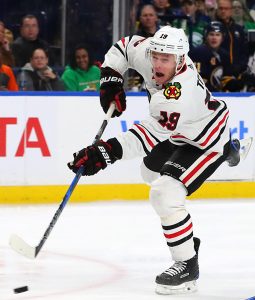With leading scorer Matt Duchene on injured reserve and expected out for “weeks”, what little chances the Ottawa Senators had of making the playoffs this season are likely to slip away. This was always the expected result of the 2018-19 season for Ottawa, but their efforts thus far to stay out of the basement of the NHL have surprised many and inspired some. However, as reality now begins to finally set in, the team must decide what they want to do with Duchene and fellow impending free agents Mark Stone and Ryan Dzingel. As Ken Warren of the Ottawa Sun writes, Duchene – currently tied for ninth in the league in scoring – will likely ask for an eight-year deal in the ballpark of $60-70MM to remain in Ottawa, reflective of the salary he will likely command on the open market. Stone will be in the same neighborhood, with Dzingel significantly lower albeit not cheap by any means, but the Senators cannot even begin negotiations with the pair until the new year, per the rules pertaining to their recent salary arbitration decisions. As such, the team is dealing with three high-quality expiring assets without any guarantee that they will be re-sign or if the team will be willing to meet their salary demands. In a season in which Ottawa could finish with one of the worst records in the league but lacks their first-round pick – given to the Colorado Avalanche in the deal that landed Duchene – it stands to reason that GM Pierre Dorion will strongly consider recouping as much trade capital as possible if extensions are not in place by the trade deadline. Given the uncertainly surrounding the ownership status of Eugene Melnyk, whose tactics thus far leave much to be desired anyway, Warren believes that Duchene, Stone, and Dzingel, as well as any other free agent in the coming off-season, will think twice about a future in Ottawa. All things considered, it’s beginning to look like the trio stand a better chance to all be traded away in the coming months than any of them do of signing a long-term extension.
- The Athletic’s Graeme Nichols wonders if yet another Senator is prime trade bait right now as well. With veteran goaltender Craig Anderson playing his best hockey of the season so far, Nichols opines that Ottawa would be best-served to try moving their starter while his stock is high. While the recent home-and-home series with the Montreal Canadiens did not go so well, Anderson did look very good in wins over the New York Rangers and San Jose Sharks prior, recording 63 saves on 65 shots over the two contests. Anderson also made 48 saves against the Dallas Stars last month and notched wins over the Tampa Bay Lighting and Pittsburgh Penguins. Admittedly, even as this best, Anderson is still a 37-year-old replacement-level goaltender at this point in his career and won’t command much of a return. However, the Senators’ season is sinking and they should get what they can while his value is potentially at its peak. The knock on moving Anderson this season has been that Ottawa has no suitable replacement – backups Mike Condon and Mike McKenna have performed very poorly in limited appearances – and thus trading Anderson means giving up on the season. Yet, with Duchene out long-term, any postseason hopes will fade and moving Anderson will begin to make more sense. As Nichols recalls, Anderson himself also alluded to a desire to move on from Ottawa this summer, so making a deal seems to be in the best interest of all parties. There are plenty of teams out there who would be intrigued by adding an established veteran in net this year and Anderson could soon fill that role.
- The Chicago Blackhawks made it known yesterday that they are looking to move out some of their defensive depth, but NBC Sports’ James O’Brien asks if they are focused on the wrong players. Rather than try to flip the likes of Brandon Manning or Jan Rutta, for which they would receive relatively little, O’Brien believes that the team’s long-term needs would be better served by trading away a mainstay like Duncan Keith or Brent Seabrook. This is not so cut-and-dry, as O’Brien admits, but would be worth looking into. Both players carry no-trade clauses that Chicago GM Stan Bowman would first need to ask them to waive. Even if Seabrook was to agree, it seems very unlikely that Bowman would find a taker for the depreciating defenseman and his albatross of a contract. If by some chance he does, it would be a small return similar to Manning or Rutta, but with a far greater salary cap relief. Keith is another matter; while not what he once was, the 35-year-old is still a very capable defenseman who would play in the top four for nearly every team in the NHL, at least for now. The worry is that Keith will continue to age and his ability will fall off, while the Blackhawks continue to pay him more than $5.5MM per year and rely on him for top minutes. Removing that crutch (and cap hit) now, in what appears to be another lost season for the team, would give Chicago a strong return that they could use to begin rebuilding the team. The alternative, which also appears to be the current plan, of waiting for the current roster to turn things around, will only increase the risk of injury or drop-off from Keith while damaging his market value as he ages. A move now would be painful to the fan base in the short term, but the right move looking toward the future.
- One team who could be a dangerous player at the trade deadline this season are the Colorado Avalanche. Per CapFriendly, the Avs are currently projected to have more than $56MM in cap space available at the deadline, or in other words have no limit to the amount of talent they can bring in if they so choose. Colorado is currently tied for the lead in the Central Division with the Nashville Predators and could even emerge as President’s Trophy threats this season. Armed with the best line in the NHL, including the top two scorers in the league, Mikko Rantanen and Nathan MacKinnon, and the best power play as well, the Avalanche are second in goals for per game among all teams. They also play well in their own end, seventh in goals against per game behind the efforts of Semyon Varlamov. Yet, the Avalanche are not without fault and could stand to add a contributor or two both on defense and up front. The team was expected to add top prospect Cale Makar to their blue line by the end of the regular season, but with his college squad, the UMass Minutemen, ranked No. 1 in the nation, Makar could be occupied through the Frozen Four tournament in mid-April. A capable puck-moving defenseman should thus be at the top of the list for Colorado, followed by an injection of offensive ability and two-way accountability among the forward corps, where their secondary scoring and penalty kill could both use work. While the matter of cost in trade capital is another question entirely, the Avalanche will have the cap space to hypothetically address their needs by adding the likes of Jordan Eberle, Kevin Hayes, and Jay Bouwmeester for example. That’s a dangerous premise for other contenders to consider as Colorado continues to excel this season.

